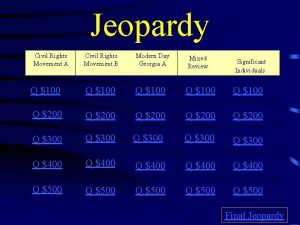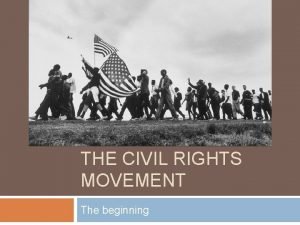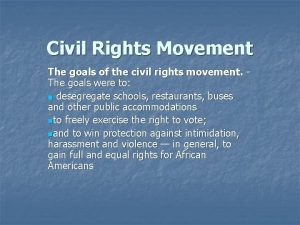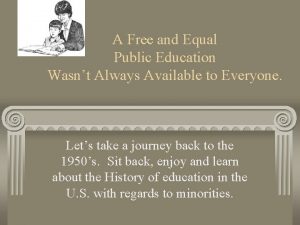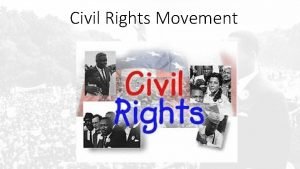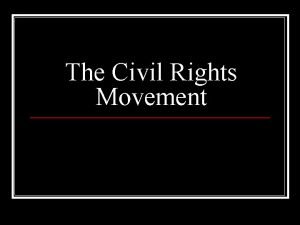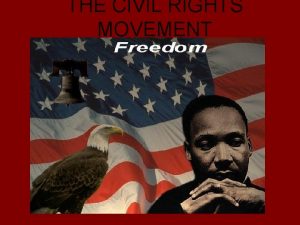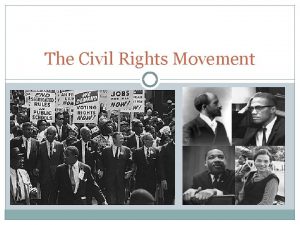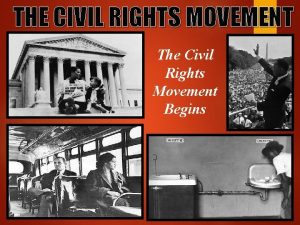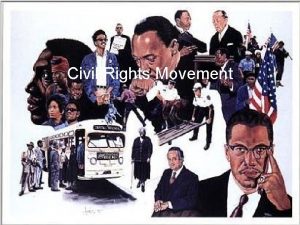Intro to the Civil Rights Movement De jure













- Slides: 13

Intro to the Civil Rights Movement • De jure – by law • De facto – in fact; in reality; actual • Segregation – the legal separation of a population, usually by race or ethnicity • Discrimination – the act of treating a member of a group differently solely because that person belongs to the group • Prejudice – to believe something about a member of a group solely because that person belongs to the group

Intro to the Civil Rights Movement • Racism – prejudice or discrimination based on race, ethnicity, or religion • Jim Crow – slang for segregation

Plessy v. Ferguson • 1896 • Established the separate but equal doctrine • Opened the door to the legal separation of blacks and whites anywhere in the US

In 1905, the issue of how to most effectively deal with Jim Crow laws was debated between Booker T. Washington and W. E. B. Du Bois

By 1910, every state of the former Confederacy had adopted laws that segregated all aspects of life wherein blacks and whites might socially mingle or come into contact.

Impact of Plessy in 1920’s

Brown v. Board of Education of Topeka, Kansas • Argued: Dec. 8, 1952 • Reargued: Dec. 7, 1953 • Decided: May 17, 1954 • Key Players – – Thurgood Marshall Rev. Oliver Brown Linda Brown Chief Justice Earl Warren

Brown v. Board of Education of Topeka, Kansas Several Cases Were Combined into One • • Delaware – Belton v Gebhart Kansas – Brown v Board of Education South Carolina – Briggs v Elliot Virginia – Davis v County School Board of Prince Edward County • Washington, DC – Bolling v Melvin Sharpe

Brown v. Board of Education of Topeka, Kansas “Separate educational facilities are inherently unequal. ”

Brown v. Board of Education of Topeka, Kansas The Issue • Schools approached equality in terms of buildings, curricula, qualifications, and teacher salaries. • Nevertheless, despite “equality” of objective factors, intangible issues foster and maintain inequality.

Brown v. Board of Education of Topeka, Kansas • This case was not simply about children and education. • This ruling law had far reaching social and ideological implications that continue to be felt throughout the nation and the world. • The struggle for Human Rights throughout the world can trace its roots back to this case. • Reinforced the supremacy of the power of the people in protecting natural rights from arbitrary limitations imposed by governments.

Brown v. Board of Education of Topeka, Kansas • The case did not abolish segregation in other public areas, such as restaurants and restrooms, nor did it place a time frame for implementation of the law. • Other pioneers would take up the torch of freedom and carry on the challenge.

1960’s
 Civil rights and civil liberties webquest
Civil rights and civil liberties webquest Civil rights movement webquest
Civil rights movement webquest Civil rights movement jeopardy
Civil rights movement jeopardy The civil rights movement
The civil rights movement Goals of the civil rights movement
Goals of the civil rights movement Civil rights movement essential questions
Civil rights movement essential questions Civil rights movement vocabulary
Civil rights movement vocabulary Rosa parks mother
Rosa parks mother De jure and de facto sovereignty
De jure and de facto sovereignty Jure šumi
Jure šumi Jure petric
Jure petric Jure grando grave
Jure grando grave De jure vs de facto
De jure vs de facto Jure radišek
Jure radišek


